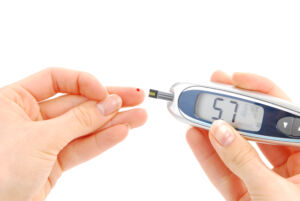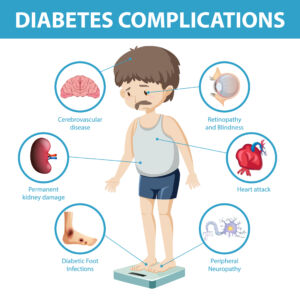
How Lifestyle Choices Affect Diabetes Management
Understanding Diabetes
Diabetes affects about 463 million adults globally. It is projected to rise to 700 million by 2045. This chronic condition leads to high blood sugar levels. It is primarily categorized into Type 1 and Type 2 Diabetes. Type 1 is an autoimmune condition. It stops insulin production. Type 2, more prevalent results from the body’s ineffective use of insulin. The rise in diabetes underlines the need for effective management.
Lifestyle choices significantly impact this pervasive disease. They can even reverse its effects. This exploration investigates how dietary habits, physical activity, stress management, and other lifestyle factors play a central role in effective diabetes management, not just as supplementary measures. Emphasizing prevention and control, and understanding how these factors interact provides a roadmap to better health outcomes for millions struggling with this condition, especially regarding reversing diabetes.
The Power of Diet in Diabetes Control
In diabetes, we cannot overstate the significance of diet. Studies have shown a balanced diet can lower HbA1c by about 1-2 percent. Such a diet includes whole foods with very low unprocessed sugar. This is essential in learning how to reverse diabetes. Which fruit is good for diabetes? Berries, citrus fruits, and apples are best due to their low glycemic index. Also, high fiber intake lowers Type 2 Diabetes risk by 20-30%. A proper diet is crucial for managing diabetes. It should include the right amounts of carbohydrates, proteins, and fats, tailored to individual needs and preferences.
Exercise, an important pillar of Diabetes Management
Exercise is an important part of diabetes management. Daily cycling or brisk walking for about 150 minutes a week can reduce the risk of developing Type 2 Diabetes by up to 40 %. For diabetics, that kind of exercise improves insulin sensitivity and glucose metabolism, so their blood sugar will be regulated more efficiently. Health workers recommend 150 minutes a week of moderate-intensity physical activity. By doing this, people could greatly improve their diabetes management and overall health.
Weight Management and Diabetes
It is crucial to managing one’s weight effectively when it comes to controlling diabetes. As many as 90% of people with type II diabetes are overweight or obese. Which fruit is good for diabetes? Fruits like berries, citrus, and apples, with a low glycemic index, can be beneficial in a diabetes diet as they do not spike blood sugar levels significantly. Losing only 5-10% of total body weight can improve insulin sensitivity, reduce blood sugar levels and thus decrease the risk of developing complications related to diabetes. In addition to helping manage their condition better, maintaining a healthy weight through eating a balanced diet together with regular exercising will also lead to improved health.
Stress and Diabetes
People often overlook stress in diabetes control. Yet, it’s crucial for managing blood sugar. Studies show chronic stress can raise glucose levels in type II diabetes. Experts estimate that those who constantly experience anxiety disorders have a 45% higher chance of developing this disease compared with others. Insulin resistance worsens due to cortisol as well as adrenalin which are both stress hormones. Thereby aggravating symptoms associated with diabetic conditions. Hence, effective stress management becomes essential. Techniques include mindfulness meditation, yoga, and getting enough sleep. Additionally, learning how to reverse diabetes through lifestyle changes and medical interventions can significantly aid in managing this condition.
Regular Monitoring and Medication Adherence
Strict monitoring and medication adherence are key for diabetes management. Consistent blood sugar checks can reduce diabetic complications. For example, in a study published by the Journal of Diabetes Science and Technology, it was discovered that individuals who carried out frequent glucose tests had a 0.5% to 1% decrease in HbA1c levels which is an important indicator for long-term blood sugar regulation. Patients adhering to prescribed medication is crucial. Noncompliance raises hospitalization risks by about 50%. This allows for timely treatment adjustments, achieving optimal control.
Impact of Alcohol and Smoking on Diabetes
The management of diabetes is significantly affected by alcohol and smoking. The effects of alcohol on blood sugar are unpredictable. Even moderate drinking may lead to either high or low blood sugar levels. In smokers with diabetes, the risk of heart disease doubles. Smoking aggravates insulin resistance, complicating glucose control. Diabetic smokers have a 30-40% higher risk of getting type 2 diabetes complications. Diabetic patients need to quit smoking and limit alcohol. This improves health outcomes for individuals with diabetes.

Role of Education in Sugar diabetes
Education plays an important role in diabetes management, providing patients with essential knowledge and skills. Statistics show that diabetics who receive comprehensive education about their condition are better able to manage blood sugar and have a 40% lower risk of complications Effective education includes understanding blood sugar levels blood levels, the effects of diet and exercise, medication adherence, and early signs of problems, and health awareness decreased cost of care.
Technological Innovations in Diabetes Management
Technology plays an important role in advancing diabetes management. People can find digital tools such as smartphone apps and continuous glucose monitoring (CGM) systems very helpful in managing their blood sugar levels. These innovations give you real-time data and trend analysis, providing a detailed understanding of your health plan. Additionally, telemedicine providers have improved access to healthcare by allowing regular visits and immediate medical advice from the comfort of your home. Experts advise exploring this technological solution as it has greatly improved and effectively managed diabetes.
Embracing a Holistic Approach
In a nutshell, managing diabetes goes beyond medication. It requires a comprehensive, holistic approach. It is important to adopt a balanced lifestyle. This includes diet, exercise, weight management, and stress reduction. Studies show lifestyle changes lower prediabetes to diabetes risk by 58% in at-risk groups. Regular exercise can reduce HbA1c levels by 1-2%. Losing 5-10% of body weight can improve insulin sensitivity. Adding these changes with screening and education improves health and life quality. Small, consistent changes are a factor in managing diabetes and reducing complication risk.



